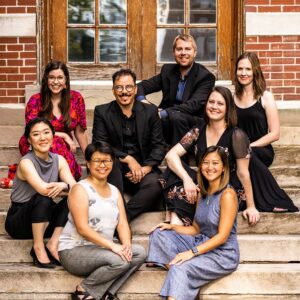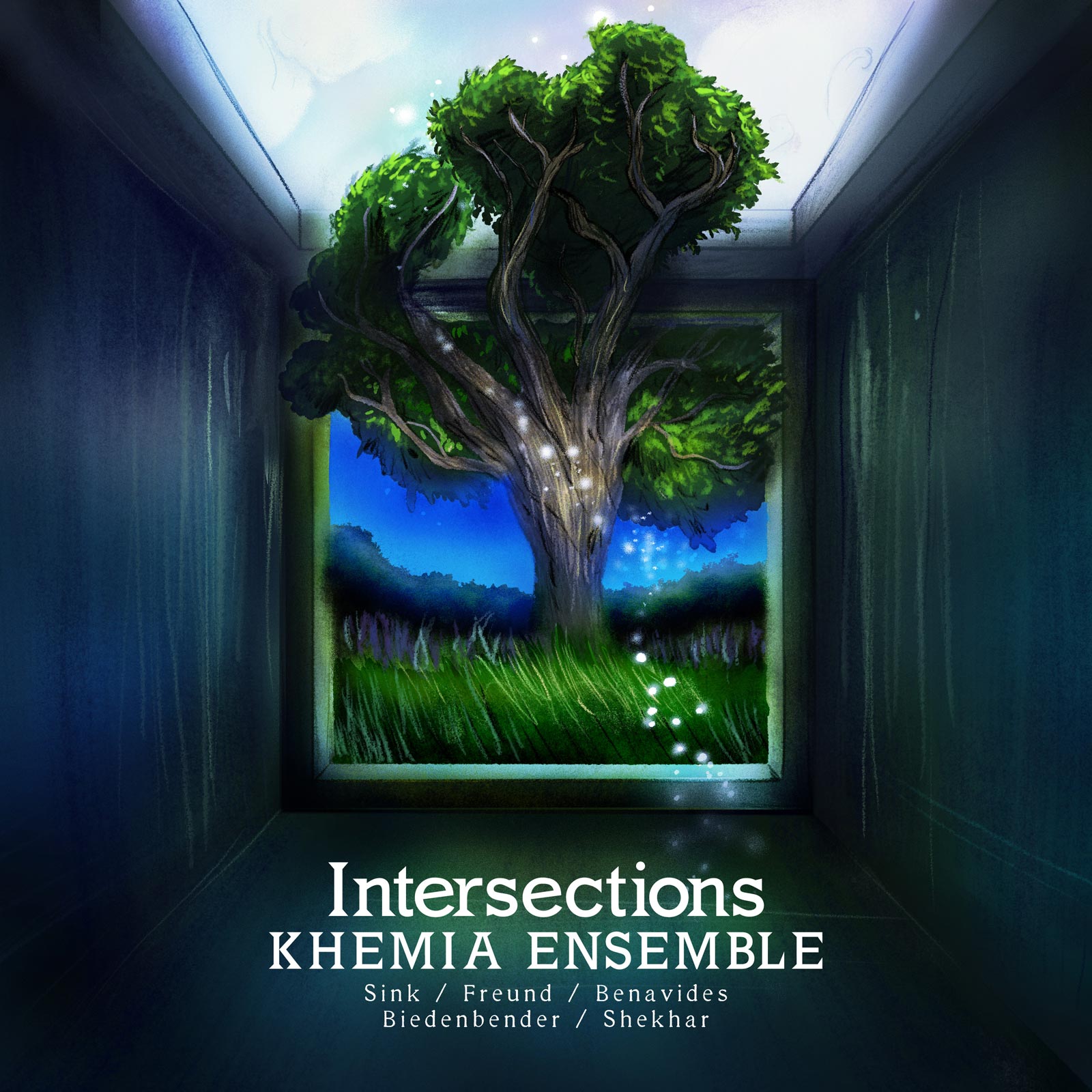Intersections
Khemia Ensemble
Phillip Sink composer
Stefan Freund composer
Nicolas Lell Benavides composer
David Biedenbender composer
Nina Shekhar composer
INTERSECTIONS from the dynamic chamber group Khemia Ensemble invites listeners to meditate on the confluence of beginnings, endings, and the hope and grief that can accompany those events. With intersections of acoustic chamber music, electronics, and multi-genre influences, the album features a stinging commentary on microagressions (Sink’s Bite!), a tumultuous mother/daughter relationship (Freund’s Song of Persephone), a tender lullaby dedicated to his newborn son, rooted in a family ritual of planting a cottonwood tree (Benavides’ Little Cloud), an exploration of memory inspired by Yayoi Kusama’s infinity rooms (Biedenbender’s in a field of stars), and an assertion of identity through Bollywood melodies and American pop sensibilities (Shekhar’s Don’t Beat a Word). By showcasing commissioned music by five living composers, Khemia Ensemble demonstrates their commitment to reflecting broader perspectives in contemporary classical chamber music.
Listen
Stream/Buy
Choose your platform
Track Listing & Credits
| # | Title | Composer | Performer | |
|---|---|---|---|---|
| 01 | Bite! | Phillip Sink | Khemia Ensemble | 8:19 |
| 02 | Songs of Persephone: I. Earth | Stefan Freund | Khemia Ensemble | 6:05 |
| 03 | Songs of Persephone: II. Gone | Stefan Freund | Khemia Ensemble | 5:59 |
| 04 | Songs of Persephone: III. Flowers | Stefan Freund | Khemia Ensemble | 8:40 |
| 05 | Little Cloud | Nicolas Lell Benavides | Khemia Ensemble | 9:38 |
| 06 | in a field of stars: Box with a door | David Biedenbender | Khemia Ensemble | 1:42 |
| 07 | in a field of stars: this world of rooms | David Biedenbender | Khemia Ensemble | 5:17 |
| 08 | in a field of stars: of endless selves | David Biedenbender | Khemia Ensemble | 2:11 |
| 09 | in a field of stars: cave of ice | David Biedenbender | Khemia Ensemble | 1:24 |
| 10 | in a field of stars: ever-swallowing dark | David Biedenbender | Khemia Ensemble | 2:25 |
| 11 | in a field of stars: fire inside winter | David Biedenbender | Khemia Ensemble | 3:25 |
| 12 | in a field of stars: pillars of light | David Biedenbender | Khemia Ensemble | 4:39 |
| 13 | Don’t Beat a Word | Nina Shekhar | Khemia Ensemble | 6:24 |
Songs of Persephone
Text by Carina Freund
in a field of stars
Text by Robert Fanning
Bite!, Songs of Persephone
Recorded July 1-3, 2021 at Sheryl Crow Hall, Sinquefield Music Center, University of Missouri in Columbia MO
Producer Bill Kalinkos
Co-Producer & Recording Engineer Eric Dluzniewski
Little Cloud, in a field of stars, Don’t Beat a Word
Recorded December 16-17, 2021 at Sheryl Crow Hall, Sinquefield Music Center, University of Missouri in Columbia MO
Producer Bill Kalinkos
Co-Producer & Recording Engineer Eric Dluzniewski
Executive Producer Bob Lord
A&R Director Brandon MacNeil
A&R Laura Ramsey
VP of Production Jan Košulič
Audio Director Lucas Paquette
VP, Design & Marketing Brett Picknell
Art Director Ryan Harrison
Design Edward A. Fleming
Publicity Patrick Niland, Aidan Curran
Artist Information

Khemia Ensemble
Hailed by the Columbia Daily Tribune as adding a “fresh dimension” to the concert experience, Khemia Ensemble is dedicated to reflecting broader perspectives in contemporary classical chamber music. With its dynamic instrumentation (soprano, flute, clarinet, violin, cello, piano, two percussion), Khemia’s unique sound world encompasses the presentation of new classical music with a mix of acoustic chamber works, multimedia, and multi-genre influences.
Notes
Pivotal moments in our lives, the choices we make, the people and experiences we meet all show us intersections previously unknown. They show us what’s at stake, but also what we are capable of. INTERSECTIONS invites us to meditate on new beginnings and endings, the hope and grief that can accompany those events, and the intersections that mark our paths forward.

